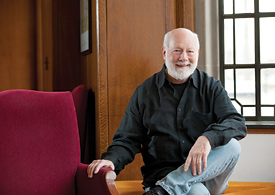Ken Mikolowski and his wife Ann in 1969 set out to print the “best of the best” in art and poetry. They bought a 1,500-pound letterpress and set it up in the basement of their home.
Together, they started The Alternative Press, and for 30 years printed some of the finest artists in both the Detroit area and nation, including poetry by Allen Ginsberg, who Mikolowski considered a friend.

Photo by Scott C. Soderberg, U-M Photo Services.
Mikolowski, who has published three books of poetry and once opened for The Stooges and the MC5, stopped The Alternative Press in 1999 when Ann died. Ann was a painter whose work has covered books and magazines and recently was featured at the Detroit Institute of Art.
He says that because the press was such a personal project with his wife, he couldn’t continue. Instead, he’s focused on his day job, teaching poetry as a lecturer IV in English at the Residential College.
Mikolowski has been at the RC since 1977. That’s when Warren Hecht, who was then the head of the RC creative writing program, lured him away from his teaching position at Wayne State University, his alma mater.
“I’ve been grateful,” Mikolowski says of his career at Michigan. “I’ve been here a long time.”
Mikolowski teaches an introductory poetry course, “The Writing of Poetry,” where students meet three hours per week to read, write and discuss poetry. He also teaches four levels of advanced writing tutorials.
The benefit of teaching and learning in the Residential College, he says, is that he gets to work with the same students during their entire college career. RC students live in East Quadrangle.
“We have a close relationship with the students,” Mikolowski says. “They can drop in whenever they want.”
What moment in the classroom or lab stands out as the most memorable?
When the “connection” is made. You can feel it.
What can’t you live without?
I think I’m supposed to say poetry, but c’mon.
What is your favorite spot on campus?
My funky old East Quad office. Ah, home!
What inspires you?
What doesn’t? As I like to tell my students, anything can be poetry, but not everything is.
What are you currently reading?
“Swamplandia” by Karen Russell. “Culture of One” by Alice Notley. And of course, numerous poetry magazines and journals.
Who had the greatest influence on your career path?
Probably the writers, artists and musicians of Detroit’s Cass Corridor.
Mikolowski says that the best part of his job is the ability to watch the students he works with grow and develop.
“I see it happen,” he says. The students “have preconceived notions of what a poem can and cannot be. What I like to do is dispel them of these notions and build from there. It’s always very rewarding. The growth and development is rapid.”
One way he is able to challenge these notions is by having the students read poetry as a model for how to write. He says, for example, that he has them read contemporary American poetry to see how our modern language can be put to work.
“There’s no reason to sound like a 200-year-old dead British poet. And (my students) think they have to,” he says.
In addition to teaching poetry, Mikolowski continues to write. He recently finished his fourth book of poetry, has been read on the BBC, and had some of his work set to music. He specializes in writing very short poems, sometimes even a word or two long.
“It’s much more concise,” he says. “It seems to be a form of expressing emotion in a very condensed way, and that’s what I do.
The weekly Spotlight features faculty and staff members at the university. To nominate a candidate, please contact the Record staff at [email protected].

